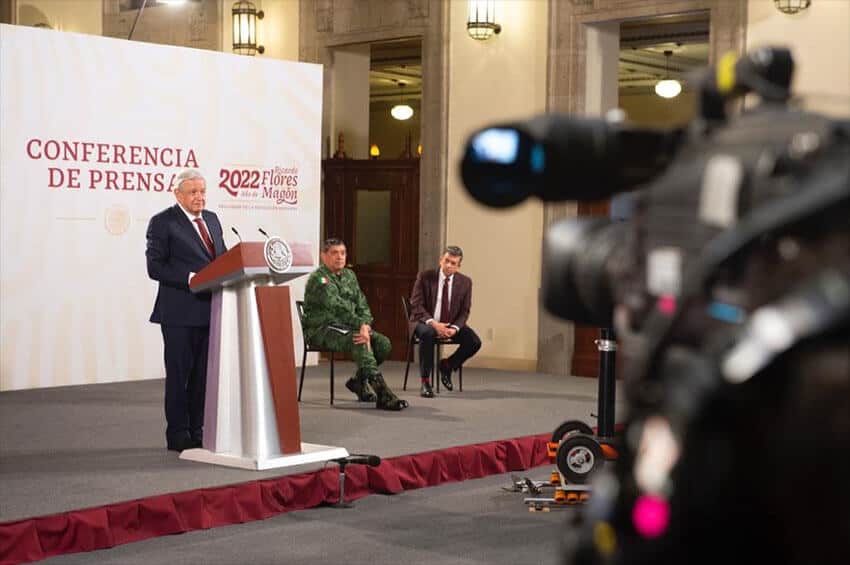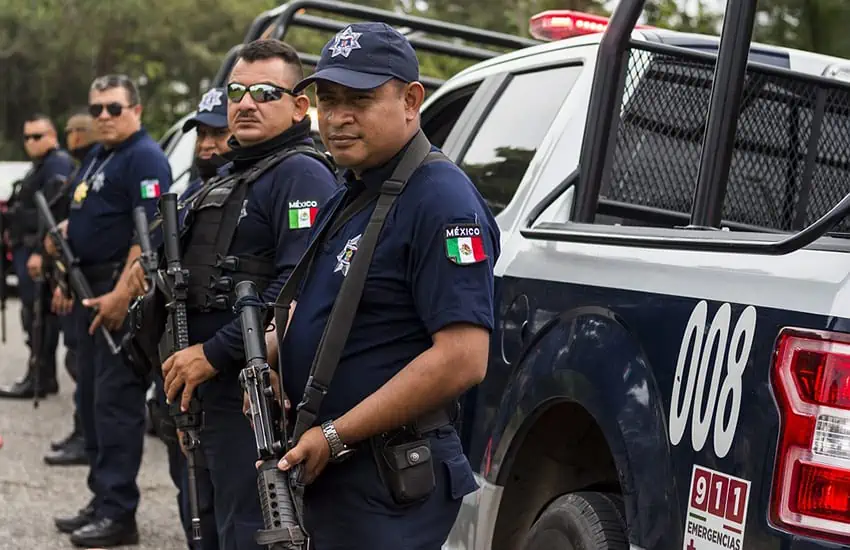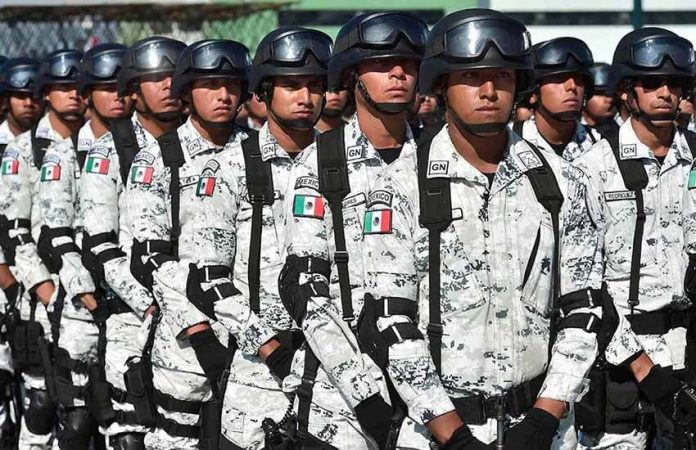President López Obrador has announced he will issue a decree to put the National Guard under the control of the army, a move that opposition lawmakers and others described as unconstitutional.
Created by the current federal government and inaugurated in 2019, the National Guard is currently the responsibility of the Security Ministry (SSPC), although it operates under army leadership on the ground.
Speaking at his regular news conference on Monday, López Obrador said he would issue an “agreement” allowing the National Guard to completely depend on the Ministry of National Defense (Sedena), a move that would change the security force’s essential nature from civilian to military.
“I want the Defense Ministry to take charge,” he told reporters. “… If it’s necessary I can modify the internal regulations of the government – it can be by decree.”

Transferring responsibility for the National Guard to Sedena by decree would bypass Congress – whose members established the security force under civilian command – but López Obrador said he would also send a proposed constitutional reform to the legislature. However, he claimed his decree would be binding even if the proposed reform doesn’t pass.
“We’re going to seek the way [to transfer the National Guard to Sedena] … administratively,” he said, emphasizing that his decree would ensure the army remains in charge of the security force no matter what the nation’s lawmakers decide.
Probed as to why he was bothering to send an initiative to Congress if he can make the desired change himself, López Obrador said he wanted to enshrine it in the constitution so that it’s not reversed later, although it appears unlikely he can get enough support to do that.
Asked whether his proposed decree was the “democratic way” forward, López Obrador responded:
“Yes, because if it isn’t I’m violating the constitution, which I’ll never do. There is no problem, but I have to use the legal margins … to make progress.”
The president – whose six-year term is on track to be the most violent in recent decades – added that his government’s agenda is stifled by an “opposition bloc that doesn’t help at all,” asserting that it rejects “everything that benefits the people.”
Before he took office in late 2018, the president advocated the creation of a National Guard under the control of the army, but the plan was criticized by a range of non-governmental organizations, which argued that it would perpetuate the failed militarization model introduced by former president Felipe Calderón in 2006. Human Rights Watch called the strategy a “colossal mistake” and “potentially disastrous.”
In early 2019, then-security minister Alfonso Durazo said that López Obrador had taken on board the different opinions about the leadership of the national guard, and Durazo asked lawmakers to modify the original proposal in order to create a national guard with a civilian command but with the same levels of discipline and training as the armed forces.

The then-minister said in January 2019 that the new force would be the responsibility of the SSPC, not Sedena as previously proposed.
While the National Guard was placed under civilian command, López Obrador has depended on the military for a range of non-traditional tasks, including public security, infrastructure construction and management of the nation’s ports and customs offices.
In May 2020, he published a decree ordering the armed forces to continue carrying out public security tasks for another four years, even though he had promised a gradual withdrawal of the military from the nation’s streets. His proposed National Guard/Sedena decree would take things a step further: it would ensure the government’s public security efforts are under a single command and seemingly guarantee that what is already a quasi-militarized security force will become a fully-militarized one.
Contradicting López Obrador’s claim, non-government lawmakers, analysts and others asserted that the president doesn’t have the authority to reassign responsibility for the National Guard to Sedena. For that to occur, the constitution must be changed, they argued, and such reforms require the support of two-thirds of lawmakers. But the ruling Morena party and its allies don’t have a supermajority in either the Chamber of Deputies or the Senate.
Jorge Álvarez Máynez, leader of the Citizens Movement party in the lower house of Congress, said the decree López Obrador announced on Monday is “a blow to the constitution.”
“There is no space for half measures in the face of constitutional coup plotting,” he wrote on Twitter. “If a public servant is incapable of defending the constitution, he has no business in the public service.”
Damián Zepeda, a National Action Party (PAN) senator, bluntly said that López Obrador’s proposed decree is “unconstitutional and militarizes the country.”
“The constitution says the National Guard is CIVILIAN,” he wrote on Twitter. “[López Obrador] doesn’t have the votes [in Congress] and is imposing an illegal agreement. It will be challenged and left in the hands of the Supreme Court. Do you now see the importance of his [Supreme Court] appointments?”
La Guardia Nacional NO puede depender de @SEDENAmx.
La Constitución establece que la Guardia es una institución de civil que estará adscrita a la @SSPCMexico.
Aunque no le guste a @lopezobrador_, un decreto no puede alterar lo que la Constitución dicta con toda claridad. pic.twitter.com/LTJ9yX3iBV
— Javier Martín Reyes (@jmartinreyes) August 8, 2022
Margarita Zavala, a PAN deputy and former first lady, was among numerous other politicians who spoke out against the president’s announcement.
“… Lawmakers of all parliamentary groups should come out in defense of the constitution and Congress,” she wrote on Twitter.
Security analyst Alejandro Hope and political scientist Javier Martín Reyes were among other observers who asserted that López Obrador doesn’t have the authority to transfer the National Guard to Sedena by decree.
“The National Guard cannot depend on Sedena. The constitution establishes that the Guard is a civilian institute assigned to the SSPC. Although López Obrador doesn’t like it, a decree cannot alter what the constitution says with complete clarity,” Martín said.
Catalina Pérez Correa, a researcher at the Center for Research and Teaching in Economics, said that the president had announced “without subterfuge” that he was going to “continue violating the constitution.”
“If the Supreme Court is going to continue allowing the president to flagrantly violate the constitution, if López Obrador is above the law and not obliged to respect the law, why do [everyday] citizens have to do it?” she asked.
With reports from Reforma
